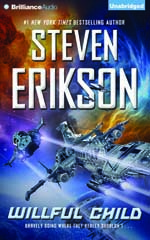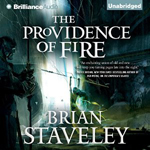
 Plague Year (Plague #1)
Plague Year (Plague #1)By Jeff Carlson; Performed by Jeffrey Kafer
Publisher: Brilliance Audio
[UNABRIDGED] – 9 hours
The nanotechnology was designed to fight cancer. Instead, it evolved into the machine plague, killing nearly five billion people and changing life on Earth forever.The nanotech has one weakness: it self-destructs at altitudes above ten thousand feet. Those few who’ve managed to escape the plague struggle to stay alive on the highest mountains, but time is running out. There is famine and war, and the environment is crashing worldwide. Humanity’s last hope lies with a top nanotech researcher aboard the International Space Station—and with a small group of survivors in California who risk a daring journey below the death line.
The first half of Plague Year grabbed my attention thoroughly. The plight of scattered survivors, barely eking out an existence on mountaintops after a plague has wiped out 99% of human civilization, fascinated me. Carlson described material and psychological conditions with great clarity.
It was also a very disturbing, sometimes horrific first half of a book. The first line welcomes us to cannibalism, and we move on to a variety of privations, torments, and deaths. Shifting perspective from a California mountaintop to a clutch of astronauts in orbit only heightened the sense of agony. This is no cozy catastrophe.
The setting alone would have been compelling, but Carlson adds hefty plot drivers to haul us along with even greater assurance. Our peak survivors learn of another group, and have to work out how to respond. The astronauts might be able to solve the plague, if only they could descend. And one survivor seems to know an awful lot about the end of the world.
The second half advances these plots, yes, and knits them together. But then Plague Year becomes a different book. Things shade from horror into action, from survival to small unit tactics. A political plot arises, but never really receives its due. And then we have a series of gunfights, standoffs, and problem-solving scenes which end up far too optimistically for what I expected. I did enjoy the expansion of the science plot, verging into hard science. But I missed the initial horror, and even the ongoing torment of one character, Sawyer the nano co-instigator, didn’t slake my awful appetite. Heck, I like playing The Long Dark for pleasure.
I listened to this book instead of reading it, and commend the reading by Jeffrey Kafer. He read the novel with mordant intensity, a splendid voice for bitter action. I’d be happy to hear Kafer read noir fiction or, well, anything bleak.
So I recommend listening to this, if possible. If your tastes are as Grand Guignol as mine, focus on the first half. If you are gentler than I, dear reader, rest assured that things do get better.
Posted by Bryan A.
 Willful Child
Willful Child Lock In
Lock In The Providence of Fire (Chronicle of the Unhewn Throne #2)
The Providence of Fire (Chronicle of the Unhewn Throne #2) The Companions (Forgotten Realms: The Sundering, Book 1)
The Companions (Forgotten Realms: The Sundering, Book 1) The Gods Themselves
The Gods Themselves